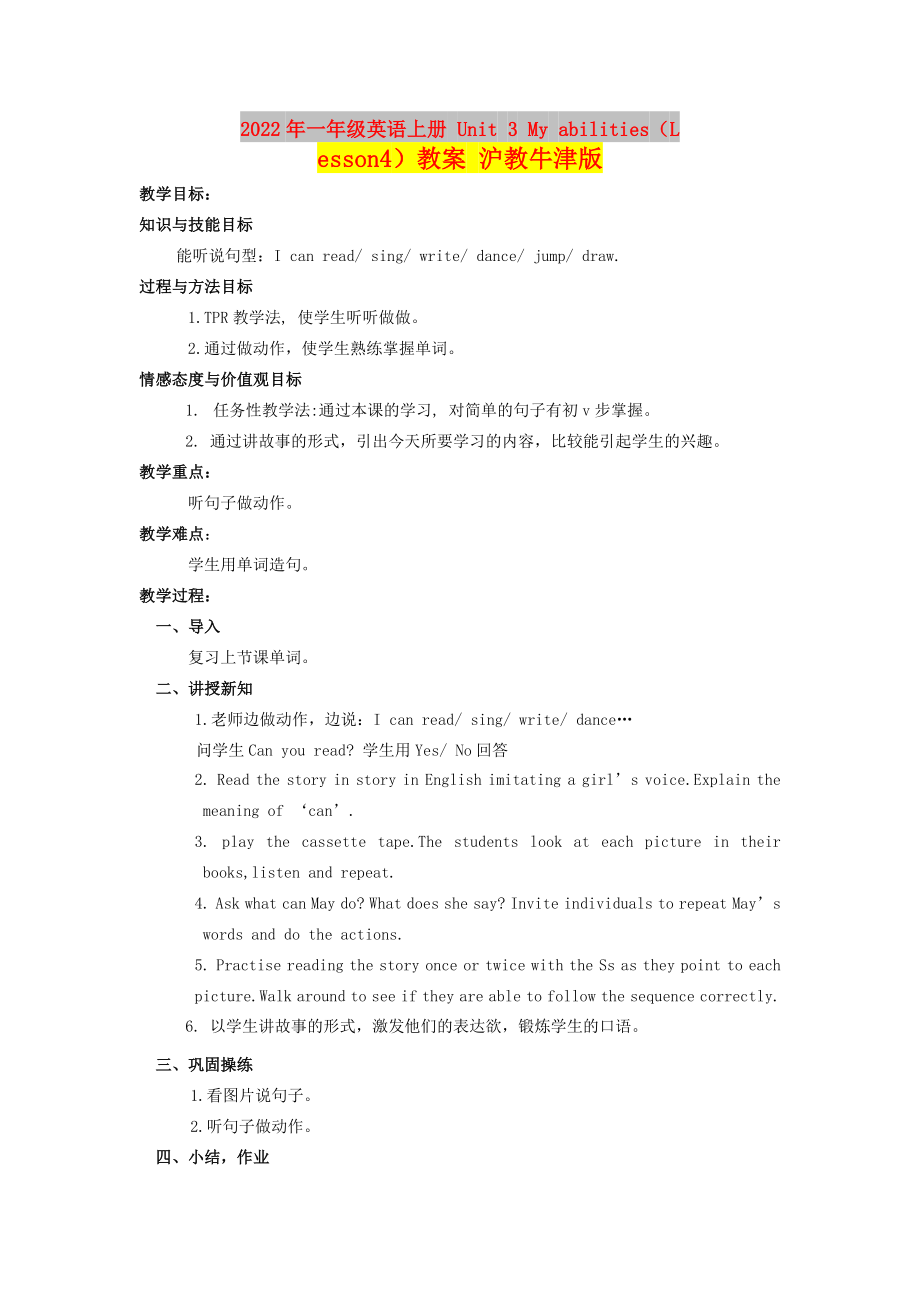《2022年一年級(jí)英語(yǔ)上冊(cè) Unit 3 My abilities(Lesson4)教案 滬教牛津版》由會(huì)員分享�,可在線(xiàn)閱讀,更多相關(guān)《2022年一年級(jí)英語(yǔ)上冊(cè) Unit 3 My abilities(Lesson4)教案 滬教牛津版(3頁(yè)珍藏版)》請(qǐng)?jiān)谘b配圖網(wǎng)上搜索�����。
1�����、2022年一年級(jí)英語(yǔ)上冊(cè) Unit 3 My abilities(L
esson4)教案 滬教牛津版
教學(xué)目標(biāo):
知識(shí)與技能目標(biāo)
能聽(tīng)說(shuō)句型:I can read/ sing/ write/ dance/ jump/ draw.
過(guò)程與方法目標(biāo)
1.TPR教學(xué)法, 使學(xué)生聽(tīng)聽(tīng)做做�。
2.通過(guò)做動(dòng)作,使學(xué)生熟練掌握單詞�����。
情感態(tài)度與價(jià)值觀(guān)目標(biāo)
1. 任務(wù)性教學(xué)法:通過(guò)本課的學(xué)習(xí), 對(duì)簡(jiǎn)單的句子有初v步掌握�。
2. 通過(guò)講故事的形式�,引出今天所要學(xué)習(xí)的內(nèi)容�,比較能引起學(xué)生的興趣�����。
教學(xué)重點(diǎn):
聽(tīng)句子做動(dòng)作��。
教學(xué)難點(diǎn):
學(xué)生用單詞造句�。
教學(xué)過(guò)程:
一、導(dǎo)入
復(fù)習(xí)
2�����、上節(jié)課單詞�����。
二��、講授新知
1.老師邊做動(dòng)作�����,邊說(shuō):I can read/ sing/ write/ dance…
問(wèn)學(xué)生Can you read? 學(xué)生用Yes/ No回答
2. Read the story in story in English imitating a girl’s voice.Explain the meaning of ‘can’.
3. play the cassette tape.The students look at each picture in their books,listen and repeat.
4. Ask what can May
3�����、 do? What does she say? Invite individuals to repeat May’s words and do the actions.
5. Practise reading the story once or twice with the Ss as they point to each picture.Walk around to see if they are able to follow the sequence correctly.
6. 以學(xué)生講故事的形式,激發(fā)他們的表達(dá)欲��,鍛煉學(xué)生的口語(yǔ)����。
三、鞏固操練
1.看圖片說(shuō)句子�。
2.聽(tīng)句子做
4、動(dòng)作�。
四、小結(jié)�,作業(yè)
句型:I can …
五、板書(shū)設(shè)計(jì)
Unit3
I can
附送:
2022年一年級(jí)英語(yǔ)上冊(cè) Unit 3 My abilities(P
eriod 3)教案 滬教牛津版
Teaching contents: Let’s learn(page 14)
Teaching aims:
知識(shí)目標(biāo):Pronounce words properly.
能力目標(biāo):Using verbs to indicate momentary actions.
情感目標(biāo):To be active in school liv
5�、es.
Difficult and key points: Using verbs to indicate momentary action correctly.
Teaching aids: Word cards, picture cards, tape.
Teaching procedure:
Procedure
Methods
Purpose
Warming-up
Sing a song.
使學(xué)生集中注意力,同時(shí)營(yíng)造英語(yǔ)氛圍
Revision
1. Act and say.
Listen to the mands and do some actions in a
6�����、quick response.
2. Say the chant:
“Show me –
Clap- ”
復(fù)習(xí)舊知�,培養(yǎng)學(xué)生的聽(tīng)力和說(shuō)話(huà)能力,復(fù)習(xí)學(xué)過(guò)的動(dòng)詞��,為新課作準(zhǔn)備�����。
Presentation
1. Point to the picture card for the word “draw” and say “draw”.
Repeat the word.
2. Act and say.
3. Show the word card and say the word.
4. Repeat step 1-3 with ‘read’, ‘write’, ‘jump’, ‘
7��、sing’ and “dance”.
5. Play the cassette.
Point to the words as it is being read out.
6. Say the words.
利用圖片�����,讓學(xué)生在單詞的發(fā)音與意義之間建立聯(lián)系�����。
訓(xùn)練學(xué)生的聽(tīng)力�,和單詞的識(shí)別能力。
Consolidation
1. Say the word, one student do the action.
and others to judge right or wrong.
2. Repeat or clap.
3. Match the words and the pictures.
4. Say and act in pairs.
5. Play the game:
What is missing?
6. Work book pagei11.
Can you find the word in the puzzle?
訓(xùn)練學(xué)生正確的發(fā)音和聽(tīng)力�����。
利用圖詞配對(duì)�,訓(xùn)練識(shí)別能力。
采用游戲方法����,訓(xùn)練學(xué)生的記憶力,進(jìn)一步加強(qiáng)單詞識(shí)別力����。
課后隨筆
成功與經(jīng)驗(yàn)�����。
板書(shū)設(shè)計(jì)
思考與對(duì)策��。
 2022年一年級(jí)英語(yǔ)上冊(cè) Unit 3 My abilities(Lesson4)教案 滬教牛津版
2022年一年級(jí)英語(yǔ)上冊(cè) Unit 3 My abilities(Lesson4)教案 滬教牛津版

